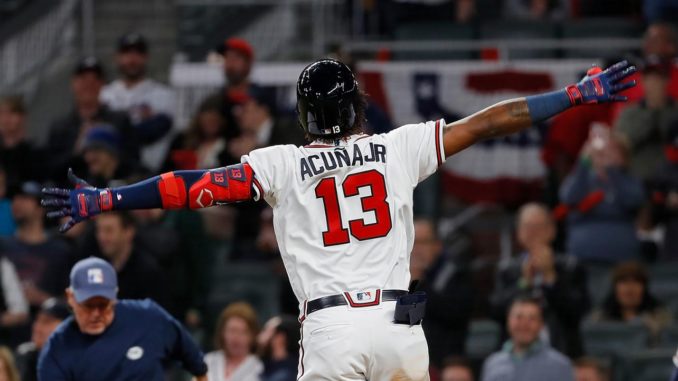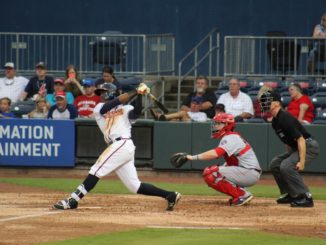
The Atlanta Braves just signed what very well might be the best $100M+ deal in baseball history. Reigning NL Rookie of the Year Ronald Acuna has reportedly agreed to an 8 year, $100M extension with Atlanta, a deal which includes two team options tacked onto the end of it. Let’s sort through it.
First off, according to Jon Heyman, this will increase Acuna’s salary in 2019. While that’s not really typical, it’s easier to think of the 2019 increase as a signing bonus. You probably don’t care about the semantics as much as you care about the basics:
2019: $1,000,000 (this includes the $560K Acuna was already slated to earn)
2020: $1,000,000
2021: $5,000,000
2022: $15,000,000
2023: $17,000,000
2024: $17,000,000
2025: $17,000,000
2026: $17,000,000
2027: $17,000,000 team option ($10,000,000 buyout)
2028: $17,000,000 team option
So, the Braves will pay Acuna $90M over the next 8 seasons, including this one. If, at that point, they wish to sever ties, they’ll owe Acuna an additional $10M, which is how we arrive at the $100M number. If Acuna remains as good as we all think he is, that $10M will be irrelevant, as the Braves hope to pick up both of those team options. That will extend the deal to 9 years, $107M and 10 years, $124M.
What this means for Ronald Acuna
Unlike many top international stars, Ronald Acuna didn’t get a multi-million dollar payday as a teenager. He signed for $100,000, which is a significant chunk of change for a kid from Venezuela, but from there on, it was minor league pay. Minor league pay is barely pay at all, so when you consider that $100K had to be stretched over several years, it seems like less of a windfall.
So, when Atlanta put 9 digits of dollars in front of Acuna, it makes sense that he’d strongly consider it. Acuna seems to love the organization and teammates, and this is a way to set himself up for life. Now Acuna can play baseball for a decade and not worry about whether an injury or a slump will cost him millions. There’s peace of mind in a deal like this, and while it’s easy for us to talk about how he could have waited and gotten more, we’re not the ones having to potentially risk a hundred million dollars by waiting. This deal signals that Ronald Acuna isn’t interested in the annual negotiations or arbitration. He wants to be a very rich person who gets to play baseball and never worry about anything ever again.
But he’s not a rich baseball player, as far as baseball players go. Acuna could draw some ire from his fellow MLB players. As owners increasingly hoard their profits, it could be disconcerting to see a player potentially trade millions for some security. That ire, however, seems misplaced. Yes, MLB players should seek more money to be put into payroll, and that’s something they can and should address for the next CBA. And the focus should be on getting more money into the pockets of young superstars like Acuna. But that’s going to have to be institutional in some way, because it’s awfully hard to fault a young Venezuelan for accepting a $100M paycheck because of what that could mean for a bunch of people who aren’t him or his family.
What this means for the Atlanta Braves
While it’s certainly not a bad day when you find out you’re going to be guaranteed a hundred million dollars, this is a much better deal for the Atlanta Braves than it is for Ronald Acuna. The Braves have access to 10 years of a budding superstar at an average of $12.4M per year. That is absurd. How much of a deal was it? Let’s try to quantify. (Warning – numbers will follow!)
Let’s use Mookie Betts as an example. Betts is a superstar outfielder who recently hit arbitration. In his first year of arb, Betts received $10.5M. In year 2, here in 2019, Betts earned $20M. Realistically, with another MVP-caliber year, Betts could see a $30M arbitration settlement next season. Let’s assume a bit of inflation and say Acuna would have had an earnings ceiling of around $12M, $22M, and $32M in his 3 arbitration seasons. That’s $66M, with around $2M in earnings prior to arbitration, for a total of $68M. There’s some risk that Acuna merely winds up a good player instead of a great one, though, so let’s mix caution with optimism and use a 6-year earnings projection of $60M. With the new deal, Atlanta is paying Acuna $56M through those 6 seasons, so that’s a pretty reasonable paycheck for both player and team.
Where Atlanta really comes out nicely on this deal, then, is with the extra years. Typically, in order to get a player to sign away free agent years at a below-market value rate, a team would overpay the arbitration years. Atlanta doesn’t appear to be doing that. What would Acuna command on the open market 6 years from now? While it could certainly be more or less, let’s say he winds up a 4 win player on a routine basis. Assuming a future rate of $9M/win in the free agent market, Acuna could then be worth $36M+ per season. Atlanta has 4 extra years of control with this new contract, worth a total of $68M. Acuna could very well be worth $144M over those 4 years.
I project Acuna to have an earnings potential of at least $200M over the next 10 years. Atlanta will get to pay only $124M. That’s an incredible deal for the Braves, a deal that should allow the Braves to add any major players they need to complement their young superstar. They have some certainty to build around going forward, and better yet, they’ve shut up all those fans who lazily assumed the team’s lack of a spending spree in the 2018-19 offseason meant the team would surrender its young players the moment they hit free agency. GM Alex Anthopoulos and the Braves are solidifying this team for the next decade, and no better step can be taken to that end than the one the organization took today.




Leave a Reply